The global ultracentrifugation tubes market is valued at USD 89.8 million in 2025 and is slated to reach USD 131.7 million by 2035, recording an absolute increase of USD 41.9 million over the forecast period. This translates into a total growth of 46.7%, with the market forecast to expand at a CAGR of 3.9% between 2025 and 2035. The overall market size is expected to grow by approximately 1.47X during the same period, supported by increasing demand for advanced laboratory equipment, growing adoption of centrifuge technologies across global life sciences research applications, and rising preference for high-performance analytical instruments across pharmaceutical and biotechnology research operations.
The ultracentrifugation tubes market represents a specialized segment of the global laboratory equipment industry, characterized by technological advancement and robust demand across research and clinical analysis channels. Market dynamics are influenced by changing research methodologies toward precision analytical systems, growing interest in sample preparation technologies, and expanding partnerships between tube manufacturers and laboratory equipment companies in developed and emerging economies. Traditional centrifugation systems continue to evolve as researchers seek proven tube alternatives that offer enhanced chemical resistance and reliable performance.
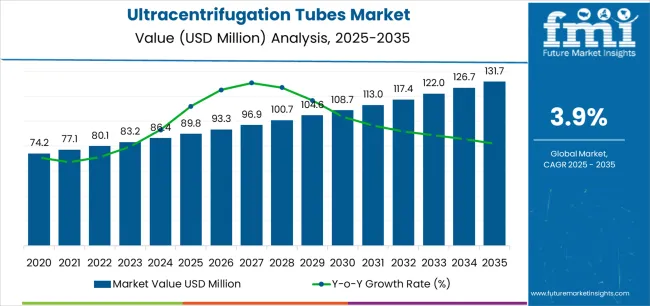
Consumer behavior in the ultracentrifugation tubes market reflects broader laboratory trends toward high-performance, chemically-resistant systems that provide both sample integrity benefits and extended operational reliability. The market benefits from the growing popularity of standard plastic tube applications, which are recognized for their advanced durability integration and user-friendly approach to sample handling management. Additionally, the versatility of ultracentrifugation tubes as both standalone laboratory components and integrated analytical system elements supports sustained demand across multiple research applications and institutional segments.
Regional adoption patterns vary significantly, with Asian markets showing strong preference for translucent tube implementations, while European markets demonstrate increasing adoption of fully transparent solutions alongside conventional research laboratory systems. The laboratory landscape continues to evolve with sophisticated and feature-rich tube products gaining traction in mainstream research brands, reflecting manufacturer willingness to invest in proven durability technology improvements and researcher-oriented features.
The competitive environment features established laboratory equipment companies alongside specialized tube providers that focus on unique material capabilities and advanced manufacturing methods. Production efficiency and product development optimization remain critical factors for market participants, particularly as raw material costs and regulatory compliance continue to fluctuate. Distribution strategies increasingly emphasize multi-channel approaches that combine traditional laboratory supply chains with direct manufacturer partnerships through technology licensing agreements and system integration contracts.
Market consolidation trends indicate that larger laboratory equipment manufacturers are acquiring specialty tube companies to diversify their product portfolios and access specialized polymer processing segments. Original equipment integration has gained momentum as research institutions seek to differentiate their analytical offerings while maintaining competitive cost structures. The emergence of specialized tube variants, including high-temperature and chemical-resistant options, reflects changing laboratory priorities and creates new market opportunities for innovative tube system developers. Manufacturing automation and quality control improvements enable consistent product scaling while maintaining traditional performance characteristics that laboratory managers expect from established analytical materials.
Between 2025 and 2030, the ultracentrifugation tubes market is projected to expand from USD 89.8 million to USD 109.2 million, resulting in a value increase of USD 19.4 million, which represents 46.3% of the total forecast growth for the decade. This phase of development will be shaped by increasing adoption of translucent tube systems, rising demand for life sciences applications, and growing emphasis on sample integrity features with enhanced chemical resistance characteristics. Laboratory equipment manufacturers are expanding their production capabilities to address the growing demand for specialized tube implementations, advanced durability options, and institution-specific offerings across research segments.
| Metric | Value |
|---|---|
| Estimated Value (2025E) | USD 89.8 million |
| Forecast Value (2035F) | USD 131.7 million |
| Forecast CAGR (2025 to 2035) | 3.9% |
From 2030 to 2035, the market is forecast to grow from USD 109.2 million to USD 131.7 million, adding another USD 22.5 million, which constitutes 53.7% of the overall ten-year expansion. This period is expected to be characterized by the expansion of medicine and biochemistry applications, the integration of innovative tube materials, and the development of specialized tube implementations with enhanced chemical resistance profiles and extended performance capabilities. The growing adoption of advanced formulations will drive demand for ultracentrifugation tubes with superior temperature resistance characteristics and compatibility with modern analytical technologies across research operations.
Between 2020 and 2025, the ultracentrifugation tubes market experienced steady growth, driven by increasing demand for translucent tube systems and growing recognition of chemical resistance as essential components for modern laboratory analytical programs across life sciences and pharmaceutical applications. The market developed as laboratory equipment manufacturers recognized the potential for tube solutions to provide both sample integrity benefits and operational advantages while enabling streamlined analytical protocols. Technological advancement in polymer chemistry and application-based development began emphasizing the critical importance of maintaining tube performance and researcher acceptance in diverse laboratory environments.
Market expansion is being supported by the increasing global demand for advanced laboratory analytical systems and the corresponding need for tube technologies that can provide superior chemical resistance benefits and sample integrity advantages while enabling enhanced analytical performance and extended compatibility across various life sciences research and pharmaceutical analytical applications.
Modern researchers and laboratory specialists are increasingly focused on implementing proven tube technologies that can deliver effective contamination control, minimize traditional sample degradation dependency, and provide consistent performance throughout complex analytical configurations and diverse environmental conditions. Ultracentrifugation tubes proven ability to deliver exceptional analytical efficacy against traditional alternatives, enable advanced laboratory integration, and support modern sample preparation protocols makes it an essential component for contemporary research and analytical operations.
The growing emphasis on analytical precision and laboratory efficiency optimization is driving demand for ultracentrifugation tubes that can support large-scale research requirements, improve analytical outcomes, and enable advanced laboratory systems. Researcher preference for products that combine effective chemical resistance with proven sample integrity and analytical benefits is creating opportunities for innovative tube implementations. The rising influence of laboratory automation trends and analytical performance awareness is also contributing to increased demand for ultracentrifugation tubes that can provide advanced features, seamless equipment integration, and reliable performance across extended analytical periods.
The ultracentrifugation tubes market is poised for steady growth and technological advancement. As laboratory equipment manufacturers across North America, Europe, Asia-Pacific, and emerging markets seek systems that deliver exceptional analytical quality, advanced chemical resistance capabilities, and reliable performance options, ultracentrifugation tube solutions are gaining prominence not just as laboratory consumables but as strategic enablers of analytical technologies and advanced research functionality.
Rising translucent tube adoption in Asia-Pacific and expanding life sciences initiatives globally amplify demand, while manufacturers are leveraging innovations in polymer engineering, advanced material integration, and chemical resistance management technologies.
Pathways like medicine application implementations, life sciences platforms, and specialized biochemistry solutions promise strong margin uplift, especially in premium laboratory segments. Geographic expansion and product diversification will capture volume, particularly where local research preferences and advanced technology adoption are critical. Regulatory support around laboratory analytical standards, chemical resistance efficacy protocols, and research safety requirements give structural support.
The market is segmented by type, application, end user, material composition, capacity range, temperature resistance, distribution channel, price range, and region. By type, the market is divided into translucent tubes, fully transparent tubes, and opaque tubes categories. By application, it covers life sciences, medicine, biochemistry, and others segments. By end user, it encompasses research institutions, pharmaceutical companies, biotechnology companies, and clinical laboratories. By material composition, the market includes polypropylene, polycarbonate, and polyethylene.
By capacity range, the market covers 1.5-15 mL, 16-50 mL, and above 50 mL. By temperature resistance, the market is categorized into standard temperature (-20 to 100°C), high temperature (100-200°C), and ultra-high temperature (above 200°C) categories. By distribution channel, the market is divided into direct sales, distributors, and online channels. By price range, the market includes premium, mid-range, and economy. Regionally, the market is divided into North America, Europe, East Asia, South Asia & Pacific, Latin America, and the Middle East & Africa.
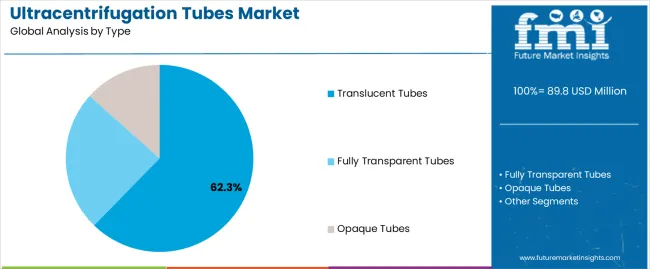
The translucent tubes segment is projected to account for 62.3% of the ultracentrifugation tubes market in 2025, reaffirming its position as the leading type category. Laboratory equipment manufacturers and system integrators increasingly utilize translucent tube implementations for their superior sample visibility protection when operating across diverse analytical platforms, excellent chemical resistance properties, and widespread acceptance in applications ranging from basic research to premium clinical operations. Translucent tube technology's established manufacturing methods and proven durability capabilities directly address the laboratory requirements for dependable analytical solutions in complex research environments.
This type segment forms the foundation of modern laboratory adoption patterns, as it represents the implementation with the greatest market penetration and established researcher acceptance across multiple analytical categories and price segments. Manufacturer investments in tube standardization and system consistency continue to strengthen adoption among laboratory equipment producers and research companies. With institutions prioritizing sample integrity and analytical reliability, translucent tube implementations align with both functionality preferences and cost expectations, making them the central component of comprehensive analytical strategies.
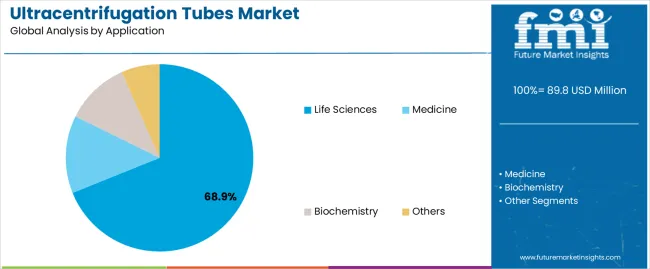
Life sciences applications are projected to represent 68.9% of ultracentrifugation tube demand in 2025, underscoring their critical role as the primary application channel for analytical performance across research operations, laboratory analytical operations, and scientific research applications. Research institutions prefer ultracentrifugation tubes for life sciences use for their exceptional chemical resistance characteristics, scalable analytical options, and ability to enhance research outcomes while ensuring consistent analytical quality throughout diverse research platforms and laboratory operations. Positioned as essential analytical components for modern scientific research, ultracentrifugation tube solutions offer both technological advantages and operational efficiency benefits.
The segment is supported by continuous innovation in life sciences technologies and the growing availability of specialized implementations that enable diverse research requirements with enhanced chemical uniformity and extended analytical capabilities. Research institutions are investing in advanced technologies to support large-scale analytical integration and research development. As analytical precision trends become more prevalent and laboratory performance awareness increases, life sciences applications will continue to represent a major implementation market while supporting advanced research utilization and technology integration strategies.
The ultracentrifugation tubes market is advancing steadily due to increasing demand for advanced laboratory analytical systems and growing adoption of tube technologies that provide superior chemical resistance characteristics and sample integrity benefits while enabling enhanced analytical performance across diverse life sciences research and pharmaceutical analytical applications. The market faces challenges, including complex polymer formulation requirements, evolving laboratory regulations, and the need for specialized manufacturing expertise and performance programs. Innovation in tube chemistry and advanced manufacturing systems continues to influence product development and market expansion patterns.
The growing adoption of advanced analytical precision, sophisticated chemical resistance capabilities, and laboratory automation awareness is enabling system developers to produce advanced ultracentrifugation tube solutions with superior sample positioning, enhanced resistance profiles, and seamless integration functionalities. Advanced analytical systems provide improved research outcomes while allowing more efficient laboratory workflows and reliable performance across various research applications and environmental conditions. Developers are increasingly recognizing the competitive advantages of laboratory integration capabilities for market differentiation and analytical positioning.
Modern ultracentrifugation tube providers are incorporating advanced polymer technology, resistance protocol integration, and sophisticated manufacturing solutions to enhance analytical appeal, enable intelligent chemical resistance features, and deliver value-added solutions to laboratory customers. These technologies improve tube performance while enabling new market opportunities, including multi-layer systems, optimized surface treatments, and enhanced temperature resistance characteristics. Advanced chemical integration also allows developers to support comprehensive laboratory tube technologies and market expansion beyond traditional analytical approaches.
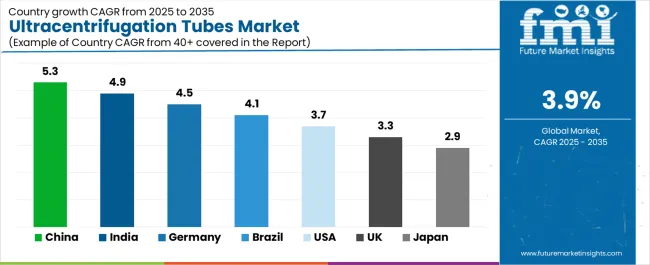
| Country | CAGR (2025 to 2035) |
|---|---|
| China | 5.3% |
| India | 4.9% |
| Germany | 4.5% |
| Brazil | 4.1% |
| USA | 3.7% |
| UK | 3.3% |
| Japan | 2.9% |
The ultracentrifugation tubes market is experiencing steady growth globally, with China leading at a 5.3% CAGR through 2035, driven by expanding life sciences research capacity, growing laboratory modernization programs, and significant investment in analytical equipment development. India follows at 4.9%, supported by increasing research infrastructure expansion, growing biotechnology integration patterns, and expanding pharmaceutical research capabilities. Germany shows growth at 4.5%, emphasizing laboratory technology leadership and analytical development.
Brazil records 4.1%, focusing on expanding research capabilities and laboratory technology modernization. The USA exhibits 3.7% growth, emphasizing analytical innovation excellence and premium tube development. The UK demonstrates 3.3% growth, prioritizing advanced laboratory technology development and research advancement trends. Japan shows 2.9% growth, supported by analytical technology initiatives and quality-focused production patterns.
The report covers an in-depth analysis of 40+ countries, with top-performing countries highlighted below.
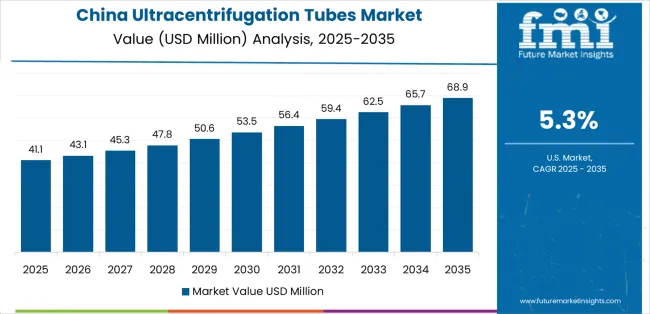
Revenue from ultracentrifugation tubes in China is projected to exhibit robust growth with a CAGR of 5.3% through 2035, driven by expanding life sciences research capacity and rapidly growing laboratory integration supported by government initiatives promoting analytical technology development. The country's strong position in research production and increasing investment in laboratory infrastructure are creating substantial demand for advanced tube implementations. Major research institutions and technology companies are establishing comprehensive integration capabilities to serve both domestic analytical demand and expanding international markets.
Demand for ultracentrifugation tubes in India is expanding at a CAGR of 4.9%, supported by the country's growing research sector, expanding laboratory technology capacity, and increasing adoption of analytical technologies. The country's initiatives promoting research modernization and growing biotechnology development awareness are driving requirements for technology-integrated analytical systems. International laboratory providers and domestic research institutions are establishing extensive manufacturing and integration capabilities to address the growing demand for advanced analytical solutions.
Revenue from ultracentrifugation tubes in Germany is projected to grow at a CAGR of 4.5%, supported by the country's laboratory technology heritage, strong emphasis on analytical technology, and robust demand for advanced tube systems in research and pharmaceutical applications. The nation's mature laboratory sector and technology-focused operations are driving sophisticated tube implementations throughout the research industry. Leading manufacturers and laboratory specialists are investing extensively in tube development and advanced integration technologies to serve both domestic and international markets.
Demand for ultracentrifugation tubes in Brazil is anticipated to expand at a CAGR of 4.1%, driven by the country's expanding research sector, growing biotechnology programs, and increasing investment in laboratory technology development. Brazil's large academic market and commitment to research advancement are supporting demand for diverse tube solutions across multiple analytical segments. Manufacturers are establishing comprehensive integration capabilities to serve the growing domestic market and expanding research opportunities.
Revenue from ultracentrifugation tubes in the USA is forecasted to increase at a CAGR of 3.7%, supported by the country's advanced laboratory technology sector, strategic focus on analytical solutions, and established research capabilities. The USA's laboratory innovation leadership and technology integration are driving demand for specialized tube implementations in premium applications, clinical laboratories, and advanced analytical systems. Manufacturers are investing in comprehensive technology development to serve both domestic specialty markets and international quality applications.
Demand for ultracentrifugation tubes in the UK is growing at a CAGR of 3.3%, driven by the country's focus on laboratory technology advancement, emphasis on premium research innovation, and strong position in analytical development. The UK's established laboratory innovation capabilities and commitment to technology diversification are supporting investment in specialized tube technologies throughout major research regions. Industry leaders are establishing comprehensive technology integration systems to serve domestic premium research production and analytical applications.
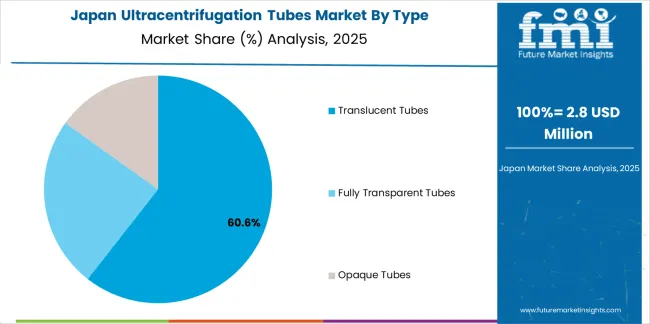
Revenue from ultracentrifugation tubes in Japan is expanding at a CAGR of 2.9%, supported by the country's laboratory excellence initiatives, growing quality technology sector, and strategic emphasis on advanced analytical development. Japan's advanced quality control capabilities and integrated laboratory systems are driving demand for high-quality tube platforms in premium applications, analytical technology, and advanced research applications. Leading manufacturers are investing in specialized capabilities to serve the stringent requirements of technology-focused laboratories and premium research industries.
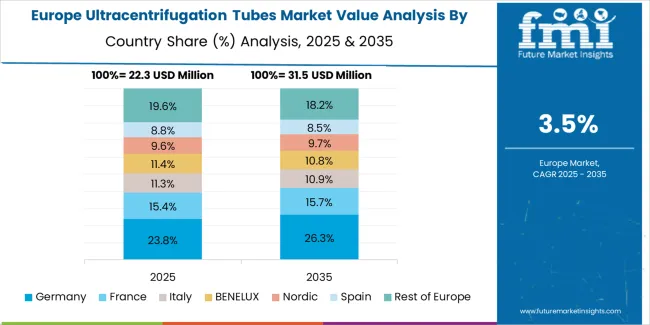
The ultracentrifugation tubes market in Europe is projected to grow from USD 24.8 million in 2025 to USD 36.3 million by 2035, registering a CAGR of 3.9% over the forecast period. Germany is expected to maintain its leadership position with a 38.7% market share in 2025, growing to 40.1% by 2035, supported by its strong laboratory engineering culture, sophisticated research capabilities, and comprehensive laboratory industry serving diverse ultracentrifugation tube applications across Europe.
France follows with a 16.9% share in 2025, projected to reach 16.5% by 2035, driven by robust demand for research technologies in academic applications, advanced biotechnology programs, and pharmaceutical research markets, combined with established laboratory infrastructure and technology integration expertise. The United Kingdom holds a 13.8% share in 2025, expected to reach 13.3% by 2035, supported by strong laboratory technology sector and growing premium research activities.
Italy commands a 10.2% share in 2025, projected to reach 9.8% by 2035, while Netherlands accounts for 6.8% in 2025, expected to reach 7.1% by 2035. Spain maintains a 4.5% share in 2025, growing to 4.7% by 2035. The Rest of Europe region, including Nordic countries, Eastern Europe, Belgium, Poland, and other nations, is anticipated to maintain momentum, with its collective share moving from 9.1% to 8.5% by 2035, attributed to increasing laboratory modernization in Eastern Europe and growing technology penetration in Nordic countries implementing advanced analytical programs.
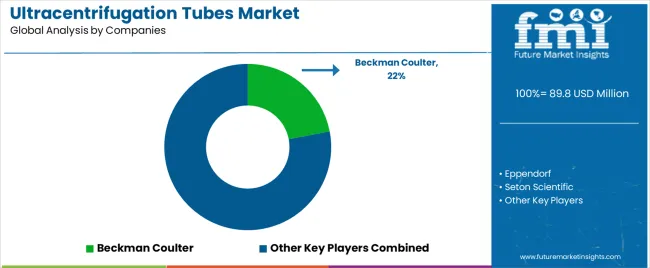
The ultracentrifugation tubes market is characterized by competition among established laboratory equipment companies, specialized tube technology developers, and integrated analytical solution providers. Companies are investing in polymer chemistry research, manufacturing optimization, advanced tube system development, and comprehensive laboratory portfolios to deliver consistent, high-quality, and application-specific ultracentrifugation tube solutions. Innovation in advanced chemical resistance integration, temperature enhancement, and analytical compatibility improvement is central to strengthening market position and competitive advantage.
Beckman Coulter leads the market with a 22% market share, offering comprehensive laboratory technology solutions including quality tube platforms and advanced integration systems with a focus on premium and life sciences applications. Eppendorf provides specialized polymer capabilities with an emphasis on advanced tube implementations and innovative analytical solutions. Seton Scientific delivers comprehensive laboratory services with a focus on integrated platforms and large-scale analytical applications. Thermo Fisher Scientific specializes in advanced tube technologies and specialized implementations for premium applications. Merck focuses on researcher-oriented analytical integration and innovative technology solutions.
| Item | Value |
|---|---|
| Quantitative Units | USD 89.8 million |
| Type | Translucent Tubes; Fully Transparent Tubes; Opaque Tubes |
| Application | Life Sciences; Medicine; Biochemistry; Others |
| End User | Research Institutions; Pharmaceutical Companies; Biotechnology Companies; Clinical Laboratories |
| Material Composition | Polypropylene; Polycarbonate; Polyethylene |
| Capacity Range | 1.5-15 mL; 16-50 mL; Above 50 mL |
| Temperature Resistance | Standard Temperature (-20 to 100°C); High Temperature (100-200°C); Ultra-High Temperature (Above 200°C) |
| Distribution Channel | Direct Sales; Distributors; Online Channels |
| Price Segment | Premium; Mid-range; Economy |
| Regions Covered | North America; Europe; East Asia; South Asia & Pacific; Latin America; Middle East & Africa |
| Countries Covered | China; India; Germany; Brazil; United States; United Kingdom; Japan; France; and 40+ additional countries |
| Key Companies Profiled | Beckman Coulter; Eppendorf; Seton Scientific; Thermo Fisher Scientific; Merck; Huahan (Suzhou) Biotechnology |
| Additional Attributes | Dollar sales by type and application category; regional demand trends; competitive landscape; technological advancements in polymer engineering; advanced material development; chemical resistance innovation; analytical integration protocols |
The global ultracentrifugation tubes market is estimated to be valued at USD 89.8 million in 2025.
The market size for the ultracentrifugation tubes market is projected to reach USD 131.7 million by 2035.
The ultracentrifugation tubes market is expected to grow at a 3.9% CAGR between 2025 and 2035.
The key product types in ultracentrifugation tubes market are translucent tubes , fully transparent tubes and opaque tubes.
In terms of application, life sciences segment to command 68.9% share in the ultracentrifugation tubes market in 2025.






Our Research Products

The "Full Research Suite" delivers actionable market intel, deep dives on markets or technologies, so clients act faster, cut risk, and unlock growth.

The Leaderboard benchmarks and ranks top vendors, classifying them as Established Leaders, Leading Challengers, or Disruptors & Challengers.

Locates where complements amplify value and substitutes erode it, forecasting net impact by horizon

We deliver granular, decision-grade intel: market sizing, 5-year forecasts, pricing, adoption, usage, revenue, and operational KPIs—plus competitor tracking, regulation, and value chains—across 60 countries broadly.

Spot the shifts before they hit your P&L. We track inflection points, adoption curves, pricing moves, and ecosystem plays to show where demand is heading, why it is changing, and what to do next across high-growth markets and disruptive tech

Real-time reads of user behavior. We track shifting priorities, perceptions of today’s and next-gen services, and provider experience, then pace how fast tech moves from trial to adoption, blending buyer, consumer, and channel inputs with social signals (#WhySwitch, #UX).

Partner with our analyst team to build a custom report designed around your business priorities. From analysing market trends to assessing competitors or crafting bespoke datasets, we tailor insights to your needs.
Supplier Intelligence
Discovery & Profiling
Capacity & Footprint
Performance & Risk
Compliance & Governance
Commercial Readiness
Who Supplies Whom
Scorecards & Shortlists
Playbooks & Docs
Category Intelligence
Definition & Scope
Demand & Use Cases
Cost Drivers
Market Structure
Supply Chain Map
Trade & Policy
Operating Norms
Deliverables
Buyer Intelligence
Account Basics
Spend & Scope
Procurement Model
Vendor Requirements
Terms & Policies
Entry Strategy
Pain Points & Triggers
Outputs
Pricing Analysis
Benchmarks
Trends
Should-Cost
Indexation
Landed Cost
Commercial Terms
Deliverables
Brand Analysis
Positioning & Value Prop
Share & Presence
Customer Evidence
Go-to-Market
Digital & Reputation
Compliance & Trust
KPIs & Gaps
Outputs
Full Research Suite comprises of:
Market outlook & trends analysis
Interviews & case studies
Strategic recommendations
Vendor profiles & capabilities analysis
5-year forecasts
8 regions and 60+ country-level data splits
Market segment data splits
12 months of continuous data updates
DELIVERED AS:
PDF EXCEL ONLINE
Tubes, Bottles and Tottles Market
Cryotubes Market
Pump Tubes Market Size and Share Forecast Outlook 2025 to 2035
Paper Tubes & Core Industry Analysis in United States Trends, Size, and Forecast for 2025-2035
Key Companies & Market Share in Paper Tubes Industry
Paper Tubes Market Growth & Industry Insights 2021-2031
Lotion Tubes Market Size and Share Forecast Outlook 2025 to 2035
Bubble Tubes Market Size and Share Forecast Outlook 2025 to 2035
Competitive Breakdown of Bubble Tubes Suppliers
Postal Tubes Market
Plastic Tubes for Effervescent Tablets Market Size and Share Forecast Outlook 2025 to 2035
Cosmetic Tubes Market by Material Type & Application from 2025 to 2035
Market Share Insights of Cosmetic Tubes Product Providers
Tracheal Tubes and Airway Products Market Analysis - Growth & Forecast 2025 to 2035
Aluminum Tubes Market from 2023 to 2033
Packaging Tubes Market Size and Share Forecast Outlook 2025 to 2035
Laminated Tubes Market Size and Share Forecast Outlook 2025 to 2035
Unit Dose Tubes Market Size and Share Forecast Outlook 2025 to 2035
Multiflex Tubes Market Analysis by Material, Product Type, Closure Type, Capacity, End-Use, and Region Through 2035
Market Share Breakdown of Laminated Tubes Manufacturers

Thank you!
You will receive an email from our Business Development Manager. Please be sure to check your SPAM/JUNK folder too.
Chat With
MaRIA